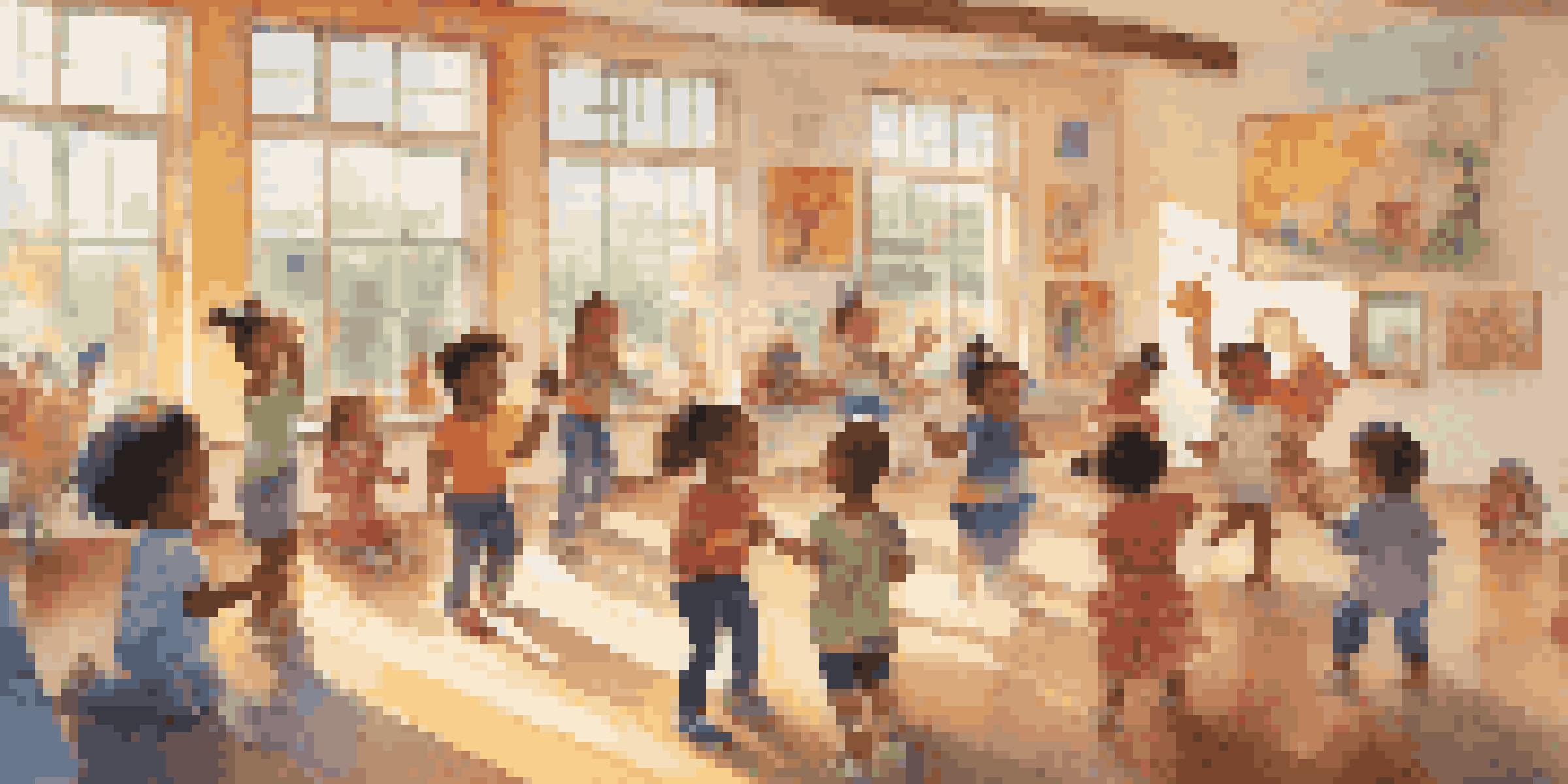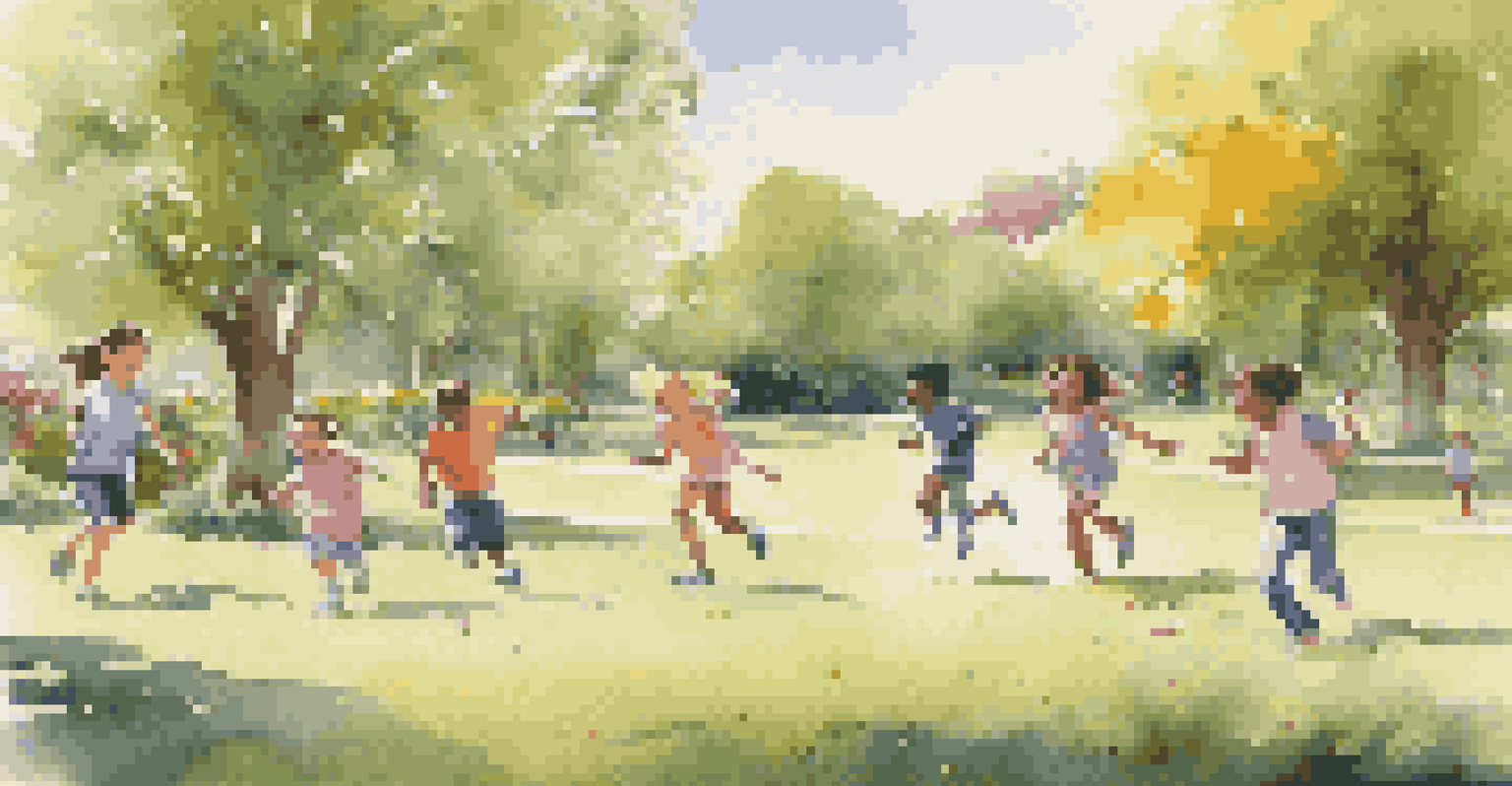The Relationship Between Music and Play in Early Childhood

The Importance of Music in Early Childhood Development
Music plays a vital role in early childhood development, serving as a tool for learning and expression. From lullabies to nursery rhymes, music engages children's emotions and helps them process their experiences. This early exposure contributes to cognitive skills, language development, and even social interactions.
Music can change the world because it can change people.
When children listen to or create music, they practice listening skills and improve their ability to distinguish sounds, which is foundational for language acquisition. Additionally, singing and clapping along to music enhances memory and rhythm, supporting overall brain development. These experiences create a rich environment that fosters curiosity and creativity.
Moreover, music can soothe a child or energize their playtime, illustrating its versatility. It provides a unique way for children to communicate feelings and connect with others, making it an invaluable resource in their formative years.
The Role of Play in Child Development
Play is the primary way children learn and explore their world, and its significance cannot be overstated. Through play, children develop essential skills such as problem-solving, social interaction, and emotional regulation. It’s in these playful moments that they learn to navigate relationships and understand rules.

Furthermore, play encourages creativity and imagination, allowing children to experiment with different roles and scenarios. This imaginative play is crucial for emotional development, as it enables children to express and process their feelings in a safe environment. The freedom to play fosters resilience and adaptability, skills that are essential throughout life.
Music Boosts Early Learning
Early exposure to music enhances cognitive skills, language development, and emotional expression in children.
In essence, play is not just a pastime; it’s a critical avenue for learning and growth. By engaging in various forms of play, children build a solid foundation for future academic and social success.
How Music Enhances Play Experiences
Music and play often go hand in hand, creating an enriched environment for children. When music is incorporated into playtime, it adds an extra layer of engagement and excitement. Imagine a simple game of tag transformed by a catchy tune that encourages movement and rhythm; it makes the experience more memorable.
Play is the highest form of research.
Additionally, music can set the mood for different types of play, whether it's calming background music during quiet time or upbeat songs for active games. This dynamic interaction helps children develop their motor skills and coordination, as they respond to the rhythm and beat of the music. It also encourages cooperative play, as children often come together to dance or sing.
Ultimately, the integration of music into play enhances the overall experience, making it more enjoyable and beneficial. This synergy not only boosts creativity but also fosters social bonds among children, laying the groundwork for teamwork and collaboration.
The Benefits of Musical Play on Cognitive Skills
Musical play significantly enhances cognitive skills in young children, providing a playful context for learning. Activities like rhythm games and musical chairs stimulate memory and attention, essential components of cognitive development. As children engage with music, they practice skills such as counting, pattern recognition, and sequencing.
For instance, clapping along to a beat helps children learn to follow patterns, which is foundational for future math skills. Similarly, singing songs with repetitive lyrics builds vocabulary and language comprehension. These playful interactions make learning fun and memorable, reinforcing concepts in an engaging manner.
Play is Essential for Growth
Through play, children develop vital social, emotional, and problem-solving skills that lay the groundwork for their future.
Moreover, musical play encourages critical thinking as children explore different sounds and create their own melodies. This exploration fosters a sense of curiosity and innovation, which are crucial for lifelong learning and problem-solving.
Social Skills Development Through Musical Play
Engaging in musical play offers significant benefits for social skills development among young children. When children participate in group music activities, such as singing or playing instruments together, they learn to share, take turns, and communicate effectively. These experiences foster a sense of belonging and community.
Moreover, musical play often requires collaboration, which encourages children to work together towards a common goal. Whether it's creating a song or performing a dance, these shared experiences help build empathy and understanding among peers. Children learn to appreciate each other's contributions, which strengthens their social bonds.
As they navigate these interactions, children also develop conflict resolution skills, learning how to negotiate and compromise in group settings. This foundation in social skills is invaluable as they grow and face more complex social dynamics.
Integrating Music and Play in Educational Settings
Integrating music and play into educational settings can be transformative for early childhood education. By creating a curriculum that includes musical activities, educators can enhance children's learning experiences and cater to diverse learning styles. Activities such as singing songs related to subjects can make lessons more engaging and relatable.
Additionally, incorporating music into playtime helps create a vibrant learning environment where children feel safe to express themselves. This approach not only supports cognitive and emotional development but also fosters a love for learning. When children see learning as fun, their motivation and enthusiasm increase.
Combine Music and Play for Benefits
Integrating music into play enhances engagement, creativity, and social interaction, creating a richer learning experience for children.
Educators can also collaborate with parents to encourage musical play at home, reinforcing the connection between music and learning. This partnership ensures that children benefit from a holistic approach that promotes their overall development.
Encouraging Musical Play at Home
Parents can play a vital role in encouraging musical play at home, making it a regular part of daily life. Simple actions, like singing during everyday routines or playing music during family activities, can create a rich musical environment. This not only enhances bonding but also fosters a love for music and play.
Incorporating instruments, even homemade ones, can ignite creativity and exploration. Children can experiment with sounds and rhythms, which helps develop their auditory skills. Additionally, family dance parties can turn any living room into a joyful space for movement and connection.

By prioritizing musical play at home, parents can help their children reap the developmental benefits of music. This nurturing environment supports emotional expression and social skills, preparing children for a lifetime of learning and collaboration.